One Blow Too Many: Why We Should Ban College Football….
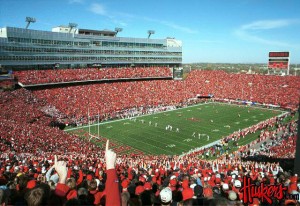 Most of us relish the spectacle of college football on crisp Saturday afternoons, sitting in the stands at a mammoth football stadium in the heart of the Big Ten or the SEC.
Most of us relish the spectacle of college football on crisp Saturday afternoons, sitting in the stands at a mammoth football stadium in the heart of the Big Ten or the SEC.
We love the marching bands, the half-time entertainment and the spontaneous camaraderie in the stands. On game day, whether Division I or II, or III, college football remains as much a part of post-secondary academia as libraries, classrooms and puny-sized dorm rooms.
It comes from our rich heritage—the love we have for our respective alma mater. All this enhanced by football hoopla, beer foam, and online bets with bookies. These incentives—along with the added bounty of bone crushing hits—make us all look forward to the gridiron experience each and every Saturday after Labor Day.
College football IS America in 2012. It is what we have evolved to since the 1950s. Athletes have become bigger, stronger, and faster. Effective training has shaved seconds off scoring dashes down field while increased duration and strength training make the player from 60 years ago to seem almost comical by comparison.
We are assured by experts that modern equipment plus critical changes in football rules provide the modern player with adequate protection on the playing field. Yet, because of the current size and speed of college athletes, the brute force inherent in being tackled or tackling remain exponentially greater than they were even 20 years ago.
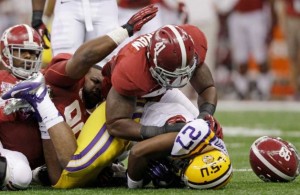 Still the thought of banning college football seems—well—it seems preposterous. It would be like banning Little League or the Pinewood Derby. Life just would not be the same. How could it be?
Still the thought of banning college football seems—well—it seems preposterous. It would be like banning Little League or the Pinewood Derby. Life just would not be the same. How could it be?
But consider this. According to Malcolm Gladwell, well-known author and columnist for the New Yorker magazine, the most compelling reason for banning college football is the number of head injuries college football players sustain in the course of a game, compounded over a season—additionally many seasons.
He is not simply referring to head concussions, which are now recognized and, to the best of our knowledge, adequately treated. Rather Gladwell focuses on multiple “repetitive sub-concussive impacts.” He contends that it is the cumulative effect of being hit day in and day out that does the most damage—damage that may be revealed only after death.
The author speaks about CTE or Chronic Traumatic Encephalopathy which he presents as the linchpin in his argument during a debate hosted by Intelligence Squared U.S.
Anyone who loves college football needs to watch (click here) this exchange.
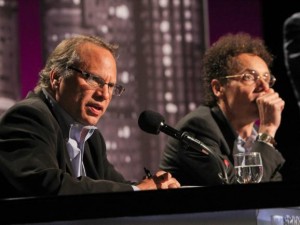 For the proposition Ban College Football were Buzz Bissinger, a Pulitzer Prize winning author and Malcolm Gladwell, a well-known, distinguished author currently writing for the New Yorker Magazine.
For the proposition Ban College Football were Buzz Bissinger, a Pulitzer Prize winning author and Malcolm Gladwell, a well-known, distinguished author currently writing for the New Yorker Magazine.
Opposing the proposition that college football be banned were Tim Green, NFL great who played defensive end for the Atlanta Falcons—recruited out of Syracuse University.
Joining Green in opposition to banning college football was Jason Whitlock who played his college football at Ball State as an offensive lineman—now a national columnist for Fox Sports.
Gladwell, in opening the debate, continued his premise that banning is necessary based on the staggering number of head injuries in the sport. Linemen, he stated, get hit on almost every play as do running backs, unless they score a touchdown. This does not occur just once a week on game day, but everyday in practice.
These sub-concussive repetitive hits accumulate, causing substantial irreversible damage.
In a previous article Gladwell had compared college football to dog-fighting where the ultimate thrill for fans comes in the potential maiming of the participants, dog or man, neither of whom is paid for his participation in the sport [The New Yorker, October 19, 2009: Offensive Play: “How Different are Dogfighting and Football?”].
Ultimately, Gladwell predicts that colleges will be sued much as NFL players today are suing their league for repeated concussions that went undiagnosed and untreated. Ultimately, CTE will bring about the decision of colleges and universities to ban the sport in its current format.
Buzz Bissinger—the author of the renowned Friday Night Lights which detailed the obsessive mania surrounding a season of high school football in Odessa, Texas—also had his reasons for promoting the banning of college football.
According to Bissinger, competitive football has nothing to do with the main purpose of college. If the primary focus of higher education is to educate, then football on campus serves no useful purpose.
In fact, it may detract from basic academic pursuits, especially when football sucks up a disproportionate amount of major resources offered by alumni and administration. In this current era of austerity, while other college department budgets are cut and tuition is hiked to cover short-falls, football budgets remain substantially intact.
Bissinger points at the exorbitant wages earned by some college football head coaches—who sometimes make five or six times what the president of the respective higher educational institute earns.
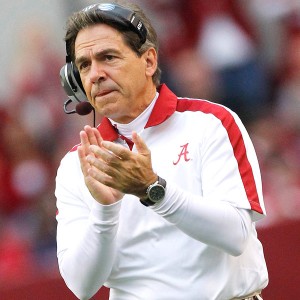 The author alleges that some major college coaching compensation packages—like those for Nick Saban of Alabama and Bob Stoops of Oklahoma—border on the obscene for salaried personnel paid by tax-supported educational institutions.
The author alleges that some major college coaching compensation packages—like those for Nick Saban of Alabama and Bob Stoops of Oklahoma—border on the obscene for salaried personnel paid by tax-supported educational institutions.
Bissinger contends that American is sinking out of sight in the current global market which itself teeters on the brink of bankruptcy. U.S. jobs have dried up and moved overseas.
Yet, our major colleges and universities continue to fail to provide a realistic educational background for those seeking to compete in a fiercely competitive world.
Our universities need to return to their primary function as leading educational centers offering high quality instruction to the youth of today who must shoulder the burden of turning our nation and our economy around—instead of caving in to alumni and illustrious coaches who demand winning football programs.
Many proponents of college football try to fall back on the argument that college football pays the way so that other needy college sports that generate little or no revenue can field teams. You may be shocked to learn from Mr. Bissinger that according to the NCAA 43 percent of the 120 major football programs lost money.
That represents revenue unrealized when attendance at games dropped so low that football could not support itself—because these schools continued to field losing teams.
Alumni continue to demand the college or university showcase a winning football team. The answer for many regent boards is to allocate more for football by cutting in other areas—even other sports.
According to Mr. Bissinger, the University of Maryland cut eight other sport programs, endeavors like track and swimming, so that the university could prop up failing football and basketball programs.
Think about it. What else of value does college football offer? Certainly the players get nothing except, perhaps, an education of questionable value. Of the millions of dollars generated by gate receipts and television rights, the players get no compensation while serving their time in a huge unpaid farm club for the NFL.
The scandals, the violence of the sport, the distraction and the lack of pay for the athlete should add up to an immediate ban, according to Mr. Bissinger.
But it will not.
Speaking against the ban, Mr. Green and Mr. Whitlock, trumpeted their traditional view about the value of team work learned as the dedicated student athlete earns his education through scholarship.
Both Gladwell and Bissinger agree that paying the athlete would make sense. That way, the athlete, after fully understanding the risks of putting on a helmet, accepts the compensation to play football—instead of pretending that this game is simply a part of the greater college experience.
Bissinger recommends removing the football program as a part of any college or university’s academic endeavors. Some other system could step in and replace the current format.
Off-campus teams might become part of an NFL farm club system associated with a particular university, even marketed as such, but not part of the tax-supported or privately supported educational system.
In one scheme discussed, players would not be required to enroll in classes. It would be optional. Footing the bill would be the NLF who would pay players and coaches at a minor league level.
All participants agreed that changes in college football were imminent. Players need to be paid. The CTE issue must be addressed. Primarily, impacts sustained by players on both sides of the ball need to be reduced.
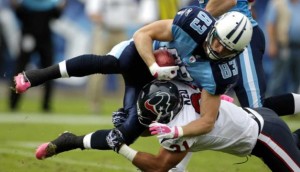 The moderator of the debate polled the live audience prior to the start of proceedings. The results of that initial poll were 16% for the proposition calling for the banning of college football, with 53% against and 31% undecided. Those results were reported once the debate concluded.
The moderator of the debate polled the live audience prior to the start of proceedings. The results of that initial poll were 16% for the proposition calling for the banning of college football, with 53% against and 31% undecided. Those results were reported once the debate concluded.
At the conclusion of the debate, the moderator polled the live audience again. Once the debate ended 53 percent favored banning college football while 39 percent were against such a ban. The remaining 8 percent were undecided
Even with being at an all-time high in popularity, football is teetering on the edge. It has always been violent, but the increased size and weight mass in players over the last couple decades makes every play more ferocious than the previous one. Our bodies (and specifically heads) can only take so much. Yet, we as fans will not be happy with a "two-hand touch" game. It will be interesting to see what happens.
16 Hands, a gallery of fine crafts, arts and gifts since 1975, features an enormous collection of functional and decorative objects: furniture, lighting, jewelry, wearable art, painting, needlework, blown glass, garden art, wood, clay and mixed media.
Oh my goodness! a tremendous article dude. Thanks However I’m experiencing challenge with ur rss . Don’t know why Unable to subscribe to it. Is there anybody getting equivalent rss problem? Anybody who knows kindly respond. Thnkx
That is really fascinating, You are an overly professional blogger. I have joined your rss feed and stay up for in quest of extra of your excellent post. Additionally, I have shared your website in my social networks
One of my friends advised me to take a peek to your post. This is getting a bit more subjective, but I much prefer to tell you that those concerned with privacy will be relieved to know you can prevent the public from seeing your personal listening habits if you so choose. Otherwise, I may say that your post is fine and my pal was right…
You should have a donate button. I could pay for this information 😉
obviously like your web site but you have to take a look at the spelling on quite a few of your posts. Many of them are rife with spelling problems and I to find it very troublesome to tell the truth then again I’ll surely come back again.
Have you considered including a few social bookmarking links to these sites. At least for bebo.
there some rly interesting content on here. I personally like bestfreepc.com tho, the offers are way better
Although I actually like this publish, I believe there was an spelling error close towards the finish of your third section.
I am in need of and I love to post your comment that this content of your post is awesome Great get the job done
Google the “new world order” please people! Spread the truth on…
If you dont mind, exactly where do you host your weblog? I am looking for a very good web host and your blog seams to be quick and up almost all the time
I feel one of your advertisements initiated my internet browser to resize, you may well need to place that on your blacklist.
fairly useful stuff, on the whole I imagine this is worthy of a book mark, thank you
Strange , this post turns up with a dark color to it, what color is the primary color on your site?
How did you make this site look this awesome! Email me if you want and share your wisdom. .
hey there and thank you for your information – I’ve certainly picked up something new from right here. I did however expertise some technical issues using this website, as I experienced to reload the web site lots of times previous to I could get it to load correctly. I had been wondering if your hosting is OK? Not that I am complaining, but slow loading instances times will sometimes affect your placement in google and can damage your high-quality score if ads and marketing with Adwords. Well I’m adding this RSS to my email and could look out for much more of your respective intriguing content. Ensure that you update this again soon..
I Am Going To have to return again when my course load lets up – nonetheless I am getting your Feed so i can read your blog offline. Thanks.
Wow! This blog is amazing. How can I make it look this good .
Is it okay to insert part of this in my personal website if I publish a reference point to this website?
Having read this I thought it was rather enlightening.
I appreciate you finding the time and energy to put
this informative article together. I once again find myself spending way too much time both
reading and leaving comments. But so what, it was still worth it!